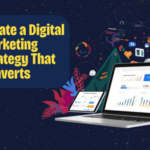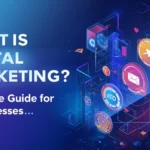Staying ahead in today’s fast-paced digital marketplace necessitates ongoing adaptability to new technology and methods. AI and chatbots have emerged as game changers, altering the way organizations interact with their audiences. In this article, we’ll look at the tremendous impact of AI and chatbots on digital marketing, including its uses, benefits, and prospects.
Understanding Artificial Intelligence and Chatbots in Digital Marketing
Before we explore their role in digital marketing, it’s crucial to understand what AI and chatbots are.
Artificial intelligence (AI) is the emulation of human intellect in machines that allows them to do activities that would normally need human intelligence. AI can process data, learn from it, and make decisions or predictions. Machine learning and natural language processing (NLP) are key components of AI that enable it to analyze and understand vast amounts of data.
Chatbots, on the other hand, are AI-driven software applications designed to simulate human conversation. They can be integrated into websites, social media platforms, or messaging apps to interact with users in real time, answering questions, providing information, or guiding them through a specific process.
The Evolution of Digital Marketing
Over the last few decades, digital marketing has seen a spectacular metamorphosis. Initially, it consisted primarily of static websites and banner advertisements. Today, it encompasses a wide range of channels, including social media, email, content marketing, and more.
The evolution of digital marketing is closely tied to the development of technology. As the digital world became increasingly complex, marketers needed more sophisticated tools to reach and engage their target audiences effectively. This is where artificial intelligence and chatbots come into play.
The Role of Artificial Intelligence and Chatbots in Digital Marketing
AI and chatbots are the vanguards of the modern digital marketing landscape. Their roles are manifold and extend across various aspects of marketing, including customer service, content creation, analytics, and personalization.
1. Enhanced Customer Service
Customer service is an essential component of any successful organization. AI-driven chatbots can provide real-time support to customers 24/7. They can answer frequently asked questions, provide product information, and even troubleshoot common issues. This not only enhances customer happiness but also allows human customer support representatives to handle more difficult issues.
2. Personalized Marketing
Artificial intelligence can evaluate user data to develop highly tailored marketing strategies. By understanding user behavior and preferences, businesses can tailor their content and offers to specific segments of their audience. Personalization improves the user experience and raises conversion rates.
3. Data Analysis and Insights
AI is a powerful tool for data analysis. It can sift through massive amounts of data to identify trends and patterns that would be impossible for humans to detect. Marketers can use AI to gain valuable insights into their audience’s behavior, allowing them to refine their strategies for better results.
4. Content Creation and Curation
Creating high-quality content is a time-consuming process. AI can assist by generating content, including product descriptions, blog posts, and even video scripts. It can also curate content from various sources, making it easier for marketers to stay up-to-date with industry trends and news.
5. Lead Generation and Conversion
Chatbots can be used for lead generation by engaging with website visitors and collecting their information. They can also guide users through the sales funnel, answering questions and providing product recommendations. Chatbots excel at capturing and nurturing leads, ultimately increasing conversion rates.
6. Social Media Management
Managing social media accounts is a time-intensive task. AI tools can schedule posts, analyze engagement data, and even suggest content ideas. This automation streamlines social media marketing efforts and allows marketers to focus on strategy rather than manual tasks.
The Advantages of AI and Chatbots in Digital Marketing
The integration of AI and chatbots in digital marketing offers numerous benefits that directly impact a business’s success. Here are a few of the more significant benefits:
1. Cost-Effective
AI-driven chatbots can handle routine customer inquiries, reducing the workload on human customer service agents. This efficiency not only saves money but also ensures consistent customer support, 24/7.
2. Improved Customer Engagement
Chatbots can engage with users in real time, offering immediate responses and guidance. This leads to better user experiences, higher satisfaction levels, and increased customer loyalty.
3. Data-Driven Decision Making
AI’s data analysis capabilities provide marketers with actionable insights. By understanding user behavior and preferences, businesses can make informed decisions and adjust their strategies for better results.
4. Enhanced Personalization
Personalized marketing campaigns are more likely to resonate with the audience and lead to higher conversion rates. AI can help create tailored content and offers for specific segments, boosting engagement and sales.
5. Scalability
AI and chatbots can handle a high volume of inquiries simultaneously, making them scalable solutions for businesses of all sizes. Whether you have ten or ten thousand visitors, chatbots can provide consistent support.
Time Savings
Automating repetitive tasks, such as data analysis, content creation, and social media management, frees up time for marketers to focus on strategy and creative work.
The Future of Artificial Intelligence and Chatbots in Digital Marketing
The use of AI and chatbots in digital marketing is already transformative, but their potential continues to evolve. Here are some prospective trends and advancements to keep an eye out for
1. Advanced AI Algorithms
AI algorithms will become even more sophisticated, allowing for a better understanding of user intent and context. This will enable chatbots to provide more accurate and relevant responses.
2. Voice Search Optimization
With the rise of voice-activated devices like Amazon Echo and Google Home, optimizing content and chatbot interactions for voice search will become increasingly important.
3. AI-Generated Video Content
AI tools will evolve to generate high-quality video content, making it easier for businesses to create engaging video marketing materials.
4. Augmented Reality (AR) and Virtual Reality (VR) Integration
Artificial Intelligence and Chatbots will likely play a significant role in AR and VR experiences, providing users with interactive and immersive marketing interactions.
5. Cross-Platform Integration
Chatbots will become more versatile, integrating seamlessly across various platforms, such as websites, messaging apps, and social media, for a consistent user experience.
6. Ethical Considerations
As AI and chatbots become more advanced, ethical considerations around data privacy, transparency, and accountability will be paramount. Marketers will need to navigate these issues while delivering value to their customers.
Challenges and Considerations
While the future of Artificial Intelligence and Chatbots in digital marketing is promising, it’s essential to address the challenges and considerations:
1. Data Security
With increased reliance on AI, data security becomes a critical concern. Businesses must take measures to protect user data and maintain trust.
2. User Experience
While chatbots can enhance user experience, they can also frustrate users if they cannot answer complex questions or handle unique situations. Striking the right balance is crucial.
3. Human Touch
Maintaining a human touch in marketing is essential. While AI and chatbots can automate tasks, it’s crucial not to lose the personal and emotional connection with customers.
4. Training and Maintenance
AI models and chatbots require ongoing training and maintenance to remain effective. Keeping up with updates and improving their performance is essential.
Conclusion
Artificial Intelligence and Chatbots in Digital Marketing
The integration of Artificial Intelligence and Chatbots in digital marketing represents a revolution in how businesses connect with their customers. From improving customer service to enhancing personalization and streamlining marketing efforts, the benefits are clear. As AI and chatbot technology continues to advance, their role in digital marketing will only become more significant. To thrive in the digital age, businesses must embrace these innovations and adapt their strategies to leverage the full potential of AI and chatbots in their marketing efforts. The future of marketing is intelligent, automated, and personalized, and it’s already here.
 seolounge
seolounge




